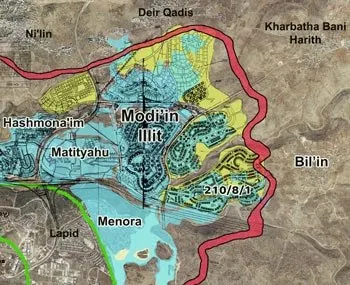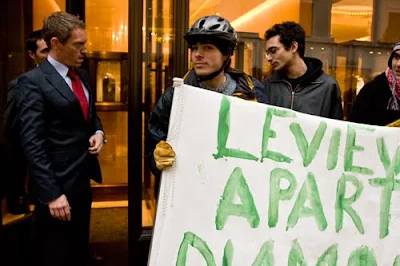 Shown above, Lev Leviev commits a compendium of human rights abuses ranging from supporting the oppressive Angolan Dos Santos regime which is renowned for its corruption, lack of transparency and violence, owning diamond mines which employ private security firms known to beat, whip and sexually abuse employees, through to purchasing rubies from Burma which supports the military junta and directly financing the expansion of illegal Israeli settlements.
Shown above, Lev Leviev commits a compendium of human rights abuses ranging from supporting the oppressive Angolan Dos Santos regime which is renowned for its corruption, lack of transparency and violence, owning diamond mines which employ private security firms known to beat, whip and sexually abuse employees, through to purchasing rubies from Burma which supports the military junta and directly financing the expansion of illegal Israeli settlements.As part of the Jewish Land Redemption Fund, Leviev finances the expansion of Mattityahu East in Modi'in Illit, Zufim, Maale Adumim and Har Homa. All of these are in violation of International Law as set down in the Fourth Geneva Convention and the position is further supported by both the UN and the international Court of Justice. The theft of Palestinian land leads to the impoverishment and subjugation of Palestinian people and violent oppression against Palestinian non-violent resistance.
On 31 August 2009, Lev Leviev, the sixth richest Israeli according to Forbes Magazine, convened a press conference and announced that his company Africa Israel will be unable to meet its financial obligations and repay its debts on time. Leviev's debt is estimated at nearly Euro 1.4 billion. While this tycoon said in August 2008 that "I will meet all of my obligations, to the last penny," he admitted in the latest press conference, one year later, that he made serious investment mistakes.
Would greed have been the motive Leviev? Abdullah Abu Rahma from the village of Bilin said that "Leviev's companies are destroying the olive groves and farms that have sustained our villages for centuries."
Ma'ale Adumim, the map speaks for itself in terms of displacing native Palestinians.
Though Leviev originally made his fortune in the diamond industry, Africa Israel is the flagship of his business empire. The company is well known for its widespread real-estate investments, but also for the fact that it builds in Israeli settlements, or colonies, in the West Bank. The company's construction projects in areas such as Ma'ale Adumim, Har Homa, Adam and Modi'in Ilit contribute to the ongoing efforts to dispossess Palestinians from their lands, to expand illegal Jewish settlements, entrench Israeli control, and place obstacles to ending the occupation and achieving peace between the Palestinians and Israel.
Here is an example of what Mr. Leviev did to the local people in order to steal their land/. The family wasn’t allowed to salvage any properties before the demolition took place and were left homeless in the cold weather. This was for expansion for Har Homa.
As a result of these construction projects, Leviev's business empire came under a massive and well-coordinated worldwide boycott campaign. Although it is difficult to organize a consumer boycott on a real-estate company, because that would amount to convincing people not to live in certain areas, supporters of the Palestinian cause for justice and freedom found creative ways to apply pressure on Africa Israel.
In the works at Moden Illit, an ultra conservative Haredi settlement, were 1500 new units that threatened the lands of Bil'in.
As the crimes of Africa Israel became infamous throughout the world, international pressure on the company began to mount. Demonstrations took place in New York City, including in front of Leviev's store on Madison Avenue. Leviev's diamonds were shunned in Dubai, and UNICEF refused a donation from him, saying "We are aware of the controversy surrounding Mr. Leviev because of his reported involvement in construction work in the occupied Palestinian territory." The UK embassy in Tel Aviv decided not to buy its office from Africa Israel while on 23 August 2009, it was revealed that Blackrock Inc., a large British investment firm, decided to divest from Africa Israel. Eight days later, Leviev convened the press conference in which he announced his inability to repay his debts.
The question that naturally arises is whether the efforts of the boycott campaign were what eventually toppled one of Israel's biggest tycoons. There is no way to answer this question based solely on financial data. Company financial reports do not include a clause for "losses because of boycott." Also, it is unrealistic to assume that the massive losses of Africa Israel result solely from the boycott ~ it is clear from company reports that the primary reason for debt is the depreciation of real-estate assets, which the company bought at tremendous leveraging. The international capitalist crisis impacted the value of the company's assets, making the huge company seem like a sinkhole of debt.
The mayor of Jayyous, which suffered incalculable losses due to Leviev's destructive rampage in the northern West Bank, reported "Leveiv is indulging in ethnic cleansing against our community and our farmers. He is building settlements at our expense; he is destroying our land, our farms, and our orchards. He sells his diamonds in New York."
While it would be irresponsible to contend that Africa Israel accumulated a significant amount of its Euro 1.4 billion debt as a result of the boycott movement, this does not mean that the boycott movement did not play a key role in toppling the company. After all, a company doesn't go into crisis because of heavy debts, but only when it cannot refinance its debts and borrow money to cover previous commitments.
The "big five" Israeli tycoons include Eliezer Fischman with debts estimated at Euro 4.2 billion, Israel Corp of the Ofer family, with debts worth Euro 7.5 billion, Delek Group of Yitzhak Tshuva, with debts amounting to about Euro 8.1 billion and I.D.B of Nochi Dankner, with debts estimated at Euro 14.9 billion.
Africa Israel has the least amount of debt amongst these tycoons, but was the first to fall, partially because its image was destroyed along with its fortunes, and because investors were wary of lending money to a company beset by protests, and facing possible litigation for crimes committed in the occupied Palestinian territories.
A group of people at the London outlet of Leviev's jewellery shop in London just before Christmas. The event was peaceful and not one person entered the shop after discussion with the group.
This did not sit too well with the Manager. Now, if he gets this hot over losing someone else's sales, imagine how he would feel were he a Palestinian robbed of home and farm at gunpoint in the middle of the night!
The other Israeli tycoons are not subject to widespread boycott campaigns, and are so far able to obtain sufficient credit from investors to keep doing business, despite the international crisis.
In, fact, the impact of boycott cannot be directly measured in numerical terms. The educational, mobilizing and psychological impacts are always more powerful than the direct economic impact. What can be measured, however, are the decisions of companies that clearly state their decisions to withdraw from illegal projects, like the statements of Blackrock regarding Leviev, or Veolia regarding the illegal light rail in Jerusalem, or companies that succumb to economic pressure faster than companies in similar financial dire straits, such as Africa Israel succumbing before Israel's more indebted tycoons.
It is too early to say what the consequences of Leviev's fall could be. His creditors are mostly Israelis, and many were invested in his companies through their pension funds. The fall could be painful for tens of thousands or even hundreds of thousands of Israelis.
Some of them might dedicate a moment of thought, as a result of losing money, to the reasons behind the boycott campaign, and to the fact that the crimes committed by their government and complicit corporations can affect them personally.
Some may realize the occupation of Palestine
is not free.
One thing is certain: the brave people who took to the streets to demand boycott, divestment and sanctions against Israel and Israeli companies received a clear message that their efforts are not in vain. Private companies that seek to make easy profits in Palestine while ignoring the injustices and illegality of Israel's crimes there, will have to think twice about their investments. They may be required to pay a price in actual money for the moral deficit in their accounts.






No comments:
Post a Comment
If your comment is not posted, it was deemed offensive.